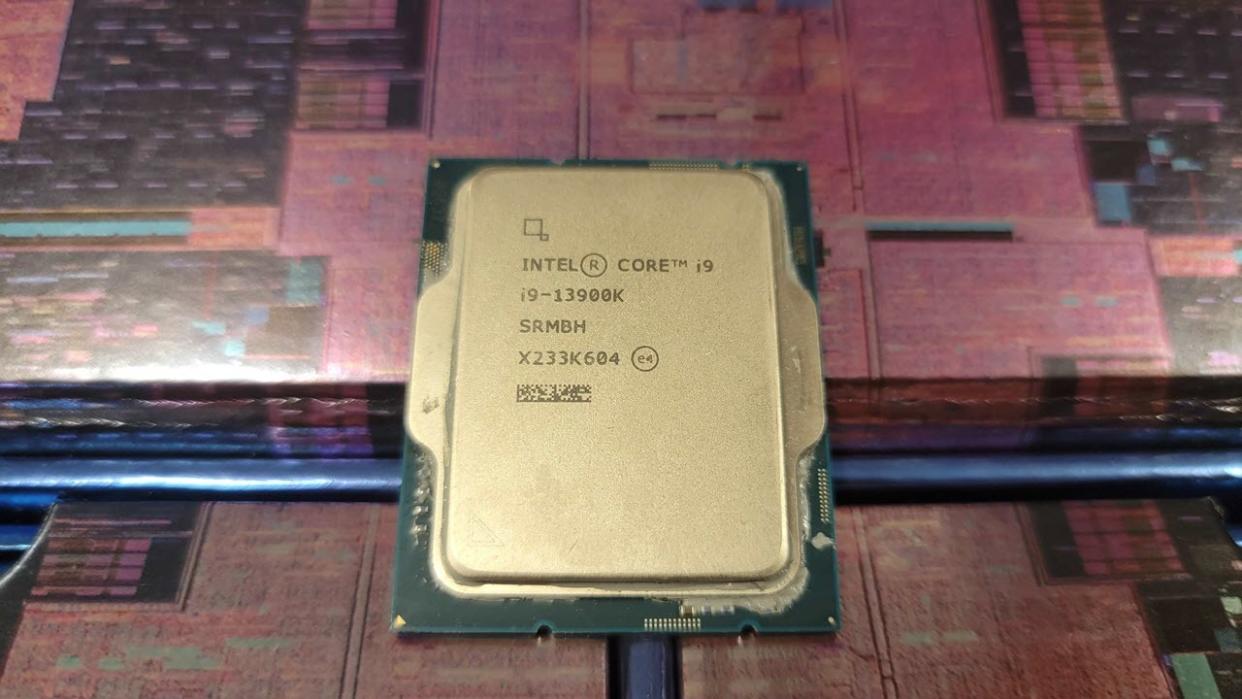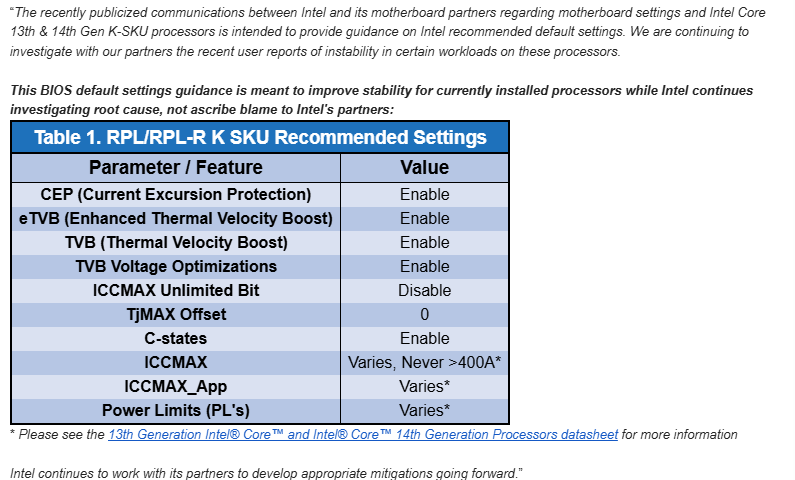Intel continues search for source of Core i9 chip crashes — issues statement about recommended BIOS settings to board partners

Intel released guidelines to its board partners regarding default BIOS settings to alleviate stability issues that some 13th and 14th Gen Core i9 CPU owners are experiencing. The new guidelines encompass recommended settings board makers should use to increase stability. However, Intel states that it's not done investigating the root cause of the stability issues. It's also careful to not blame its board partners for the aforementioned instability issues.
Intel's guidelines consist of a graph showing a number of parameters it recommends its board partners apply by default (for the "out of the box" experience). These settings include specific Intel technologies that should be turned on, voltage optimizations, and C-states.

Intel recommends Current Excursion Protection (CEP), Enhanced Thermal Velocity Boost, Thermal Velocity Boost, Thermal Velocity Boost Voltage Optimizations, and C-states all be enabled by default. The ICCMAX Unlimited Bit is recommended to be set to disabled by default, and TjMax offset is recommended to be set to 0.
The most controversial aspect of Intel's recommenced settings is the power limits. For the ICCMax, ICCMax_App, and Power Limits, Intel does not state a specific wattage limit. Instead, it leaves these parameters to the board makers. However, it does state that the ICCMax setting should never exceed 400 amps. Interestingly, this is one of the things our GPU reviewer noticed with his particular Core i9-13900K processor.
These recommended settings reveal that Intel is not convinced unlimited power limits are the primary issue. For now, it seems like Intel is more concerned about other parameters that apparently affect stability, including Current Excursion Protection and TVB Voltage Optimizations. One interesting tidbit is that Intel does provide an amperage limit on the ICCMax setting that's much slower than the maximum 512 amps limit motherboard makers can use.
However, there's no guarantee these settings will completely fix the instability issues. Intel has confirmed that it still hasn't figured out the main culprit for the 13th and 14th Gen problems. As a result, we expect Intel's recommended settings will change at a future date once it figures out the problem — or perhaps it will simply offer to replace affected chips with better versions that don't exhibit the problems.
Stability issues surrounding some 13th and 14th Gen chips (particularly Core i9 CPUs) have been around since the Core i9-13900K first began shipping in late 2022. But things started gaining traction a few months ago with numerous reports of in-game instability in Unreal Engine 5 games. WCCFTech's Hassan Mujtaba as well as our own GPU reviewer personally encountered problems, RAD tools issued a statement regarding the problem, and things have reached the point where it has triggered an official investigation from Intel to figure out the root cause and hopefully a solution.
There are many theories on the instability problems, and many believe it comes down to the amount of power these chips can consume. Unlike AMD, Intel does not have strict guidelines on power consumption for its desktop processors, instead letting its board partners decide what power limits to give the processors. This has given Intel a reputation of late for having extremely hot and power-hungry chips, with its latest core i9 chips capable of drawing over 400W of power in the right (or wrong) environment.
One major factor with these instability reports is that they don't happen to everyone, with only what appears to be a relatively small subset of chips being affected. Apparently, the silicon lottery has become enough of a factor that certain chips on the "losing" end of the spectrum are impacting CPU stability even when users aren't overclocking.
The good news is that Intel is still working on the matter, and some of its board partners, such as Gigabyte, MSI and Asus have provided guides and/or BIOS updates to rectify 13th and 14th Gen stability issues on their boards. The bad news is that many of the fixes also negatively impact performance. Until Intel can provide a concrete solution, instability may continue to be a problem for certain chips.

